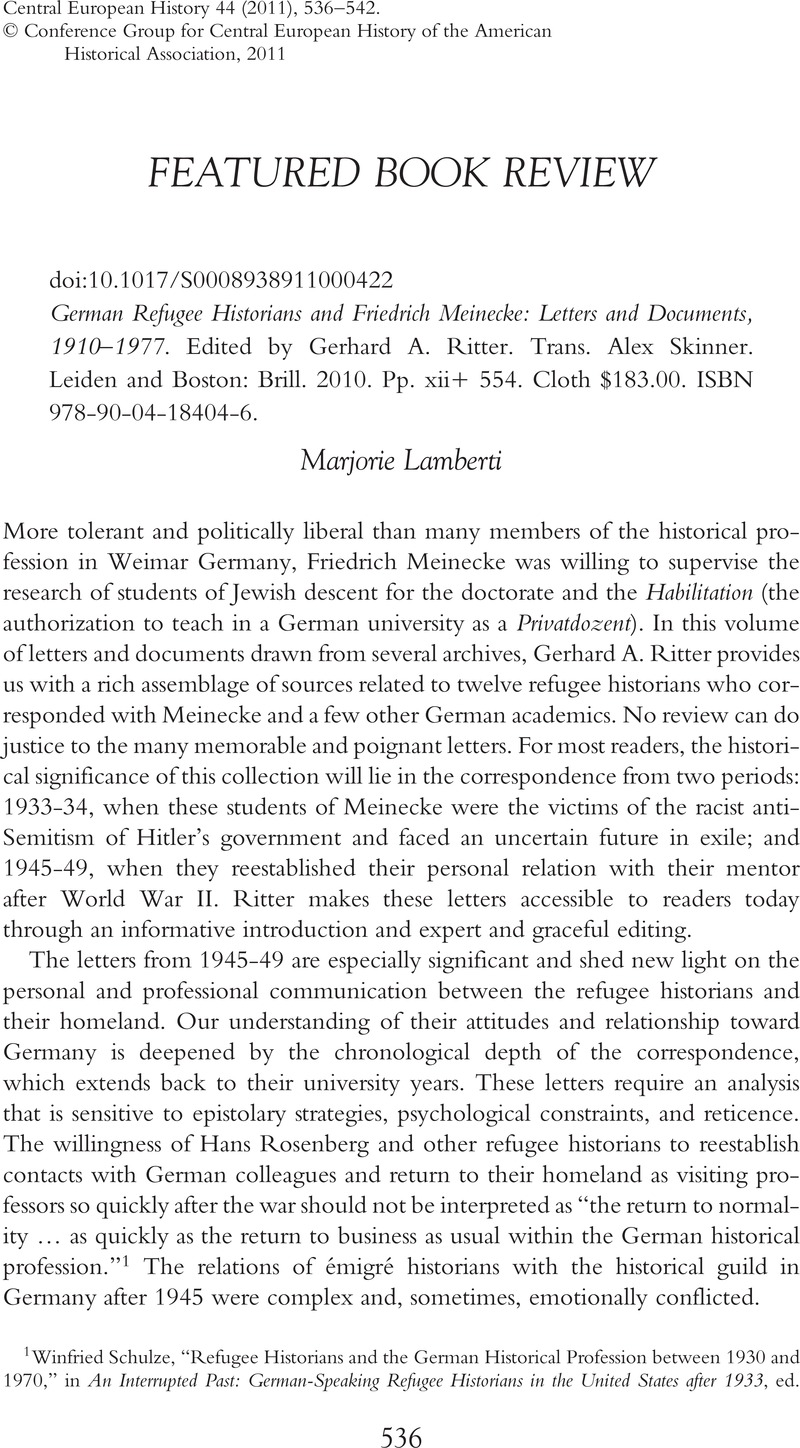Published online by Cambridge University Press: 05 September 2011

1 Schulze, Winfried, “Refugee Historians and the German Historical Profession between 1930 and 1970,” in An Interrupted Past: German-Speaking Refugee Historians in the United States after 1933, ed. Lehmann, Hartmut and Sheehan, James (Cambridge: Cambridge University Press, 1991), 220Google Scholar; Schulze, Winfried, Deutsche Geschichtswissenschaft nach 1945 (Munich: Oldenbourg, 1989), 143Google Scholar.
2 Masur, Gerhard, Das ungewisse Herz (Holyoke, MA: Blenheim, 1978), 107Google Scholar.
3 Gilbert, Felix, “Friedrich Meinecke,” in Gilbert, Felix, History, Choice, and Commitment (Cambridge, MA: Harvard University Press, 1977), 72–74CrossRefGoogle Scholar.
4 See the pride in this historical tradition in Gilbert, Felix, A European Past: Memoirs, 1905–1945 (New York: Norton, 1988), 70Google Scholar; Holborn, Hajo, “Wilhelm Dilthey and the Critique of Historical Reason,” Journal of the History of Ideas 11, no. 1 (January 1950): 97, 114–15CrossRefGoogle Scholar.
5 Felix Gilbert, “The Historical Seminar of the University of Berlin in the Twenties,” in An Interrrupted Past, ed. Lehmann and Sheehan, 68–69.
6 Meinecke, Friedrich, “Zur Selbstbesinnung,” in Meinecke, Friedrich, Werke, vol. 2: Politische Schriften und Reden (2nd ed., Darmstadt: Siegfried Toeche-Mittler, 1966), 484Google Scholar.
7 Meinecke, Werke, vol. 6: Ausgewählter Briefwechsel (Stuttgart: Koehler Verlag, 1962), 254Google Scholar.
8 Eberan, Barbro, Luther? Friedrich der Grosse? Wagner? Nietzsche? Wer war an Hitler Schuld? Die Debatte um die Schuldfrage 1945–1949 (Munich: Minerva, 1983), 37–39Google Scholar.
9 Holborn, Hajo, History of Modern Germany, vol. 3 (New York: Knopf, 1969), 810Google Scholar.
10 Bremen, Radio, Auszug des Geistes (Bremen: Verlag Heye, 1962), 194Google Scholar.
11 See Raul Hilberg's recollection of a classroom confrontation with Rosenberg at Brooklyn College when he, a student, raised a question about the Nazis' mass killing of European Jews, in Hilberg, Raul, The Politics of Memor: The Journey of a Holocaust Historian (Chicago: Ivan Dee, 1996), 58–59Google Scholar.
12 See, for example, Helene Wieruszowski's experiences as a visiting lecturer at the University in Heidelberg in 1948 in “Gespräche mit deutschen Studenten,” Die Wandlung 4 (1949): 82–91Google Scholar.
13 Katz, Barry, Foreign Intelligence: Research and Analysis in the Office of the Strategic Services, 1942–1945 (Cambridge, MA: Harvard University Press, 1989), 90CrossRefGoogle Scholar; Gilbert, A European Past, 193, 214–15.
14 U.S. National Archives, General Records of the State Department, RG 59, Decimal File, 1945–49, Box 740/00119, Holborn's reports, submitted on January 19, 1948.
15 Holborn, Hajo and Barraclough, Geoffrey, “Irrwege in unserer Geschichte?,” Der Monat 2, no. 17 (February 1950): 531–38Google Scholar.